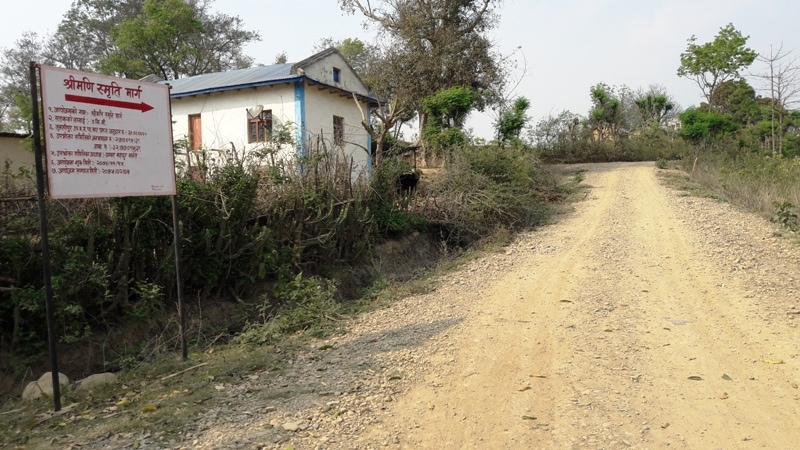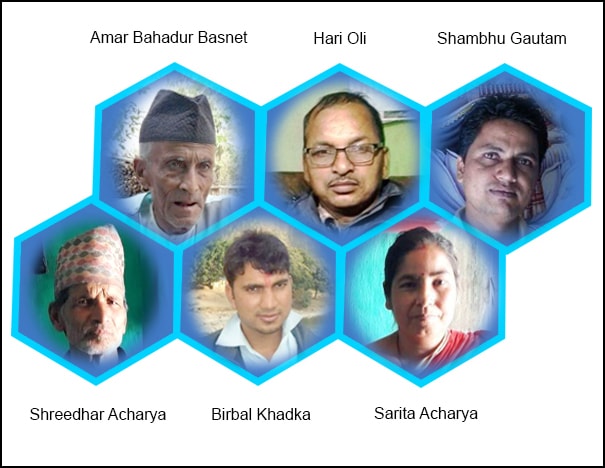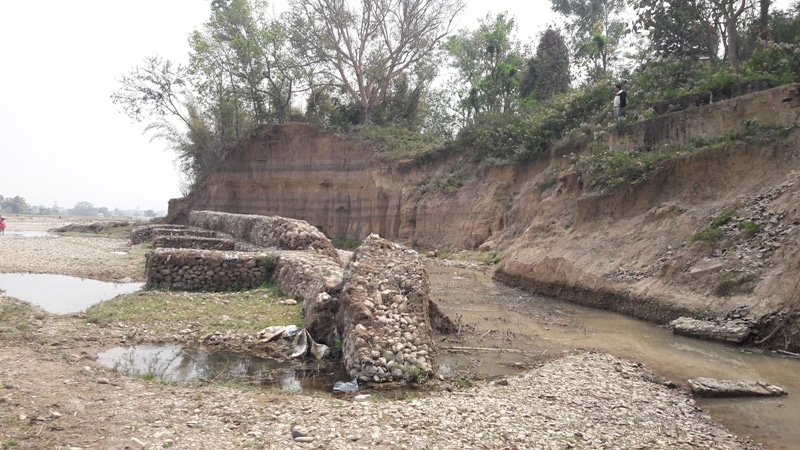A revelation of how user committees forge consensus on making easy money through unfair means and commission. A field report of eight projects in Dang district.
Devendra Basnet: Centre for Investigative Journalism-Nepal
Tulsipur Sub-Metropolis-11 had in fiscal year 2017/18 allocated a budget of Rs three million to a local user committee to gravel a four-kilometer road at Hasanpur of the sub-metropolis.

Consumer Committee contracted to build a road in Shreemani Marg, Tulasipur -11
An agreement which was signed between the sub-metropolis and user committee led by Amar Bahadur Basnet saw an additional amount of Rs 2 lakh 77 thousand as part of the consumers’ labor contributions fund.
However, in what came as a surprise to many, the committee awarded to Shambhu Gautam, a local contractor, to construct the section of the road without acquainting the matter to the sub-metropolis. It was later revealed that contractor Gautam had agreed to complete the project at Rs. 13 lakhs 50 thousand only.
Conceding to have made an agreement surreptitiously, committee chairperson Basnet defended the move labelling it as a “deliberate and unanimous” decision since they believed that they would be unable to accomplish the work within the stipulated timeframe.
The Public Procurement Act 2064 states that a user committee or beneficiary community shall itself complete the work provided to it, and such work shall not be subcontracted to any construction entrepreneur or sub-contractor.
According to sub-clause 10 of Clause 97 of the Act, if for any reason the committee or community is not able to complete that work itself in time, it shall give information thereof to the public entity. Upon receipt of such information, the public entity shall make necessary inquiry thereinto, break the contract entered into with such committee or community and procure the remaining work in accordance with the Act and these Rules.
However, the user committee breached the provision of the Act. Contractor Gautam completed the project on May 19, 2018 at a total cost of Rs 13 lakhs 50 thousand. Here, a question pops up: Where has the remaining budget gone? Consider what committee chairperson Basnet had to say: “To be honest, I am unaware of the financial aspect.”
Hari Kala Dangi, treasurer of the user committee, revealed that the committee office bearers had forged consensus to distribute the rest of the budget among themselves. Dangi’s revelation came since she did not receive her share.
Exposing further the delinquencies, she said that they had ‘negotiated’ with a dozer for Rs. 1,800 per hour even though the actual charge was Rs 2,000. The committee members had even agreed to distribute the ‘discounted’ amount among themselves. “They did not give me a single penny,” she said.
Basnet and Dangi unanimously revealed that committee secretary Hari Oli, who awarded the contract to Gautam on the basis of nepotism, was in-charge of budget management.
Says Basnet, “When I told Oli that I would not be able to take up the responsibility at the age of 70 years, he insisted that he would look after all managerial work if I agreed to shoulder the responsibility of the chairperson. To be honest, he took all the responsibilities including rewarding the contract to Gautam.”
Secretary Oli, meanwhile, admitted of shouldering all responsibilities of the committee. He, however, brushed aside allegation of financial irregularities on his part. Denying charges of financial irregularities, he said, “The remaining amount has been spent in paying the workers and purchasing equipment.” Treasurer Dangi, however, says, “They took all money by making fake documents that showing exaggerated remuneration and wages.”
According to the Local Government Operation Act 2074, a project below Rs 5 million has to be done through the consumers’ (user) committee. Prime Minister Directives has widened the involvement of people’s participation in local development efforts. However, the consumers’ committees have breached this provision by playing the role of a ‘mediator’ or ‘agent’ and giving away contract to contractors from where they get benefitted financially.
User committees in Dang have awarded most of the projects worth up to Rs one million to contractors. “According to provision, a user committee is obliged to complete a project by itself. However, the committees play the role of agents or brokers by giving away contracts to local contractors on the basis of nepotism. My ward is not an exception,” revealed ward chairperson of Ghorahi sub-metropolis. “This is the practice all over the district,” he said.
These committees take two to six percent commission of the total budget for the project awarded to contractors. “It’s all about the game of commission,” Daibagya Raj Joshi, a civil engineer who had worked at the Rajpur village municipality said. “These committees usually receive two to six percent commission from the contractors.”
Fake documents
These consumers’ committees make fake documents as evidence to show their direct involvement in the projects. On the basis of these fake documents, the local governments allocate the budget to these committees. For instance, a four-kilometer road was graveled through a contractor at Kataha of Tulsipur-11. However, the consumers’ committee produced fake papers at the sub-metropolis as evidence showing that they accomplished the project themselves. The sub metropolis endorsed it without thoroughly scrutinizing the documents.
 A user committee, which was entrusted with the task of graveling a six-kilometer road at Babai rural municipality-3, awarded the contract to two different contractors and allocated the budget accordingly. The rural municipality had allocated Rs three million for the project. However, the committee chairperson Hari Prasad Jaisee awarded the contract to Jiwan Oli and Navaraj Buda, both contractors.
A user committee, which was entrusted with the task of graveling a six-kilometer road at Babai rural municipality-3, awarded the contract to two different contractors and allocated the budget accordingly. The rural municipality had allocated Rs three million for the project. However, the committee chairperson Hari Prasad Jaisee awarded the contract to Jiwan Oli and Navaraj Buda, both contractors.
“The estimation was to gravel only 6 kilometers of the road,” Oli said, adding, “We (two) accepted the contract, and agreed to complete three kilometers each. We divided Rs 7 lakh 49 thousand, which we received for the project.”
Here, a question arises: What did the consumer’s committee do with the remaining amount? Chairman Joshi says, “We have not yet gone through the financial part. Let’s hope that the remaining amount will be used up by the time the construction of the road gets completed.”
There is a Dalit village in Tulsipur sub-metropolis-12. The ward office decided to construct an embankment at the Gwarkhola (river), which was posing threat to the Dalit village every year during monsoon.
The ward office decided to allocate Rs one million to construct the embankment. Meanwhile, the user committee gave away the contract to Birbal Khadka, a contractor, to construct the embankment. Says Shreedhar Acharya, Chairperson of the committee, “Since we cannot work on our own, we decided to hire a contractor. I have no idea what other members do. But I have not misused a single penny. I merely agreed to the decisions given by the members.”
This is a glaring example of how user committees have been breaching the local government provisions and squandering public fund. This trend has been rampant in the district since the committees are accustomed to making money effortlessly.
For instance, the lawmaker’s development fund passed a budget of Rs 2.5 million in the name of parliament member Hira Chandra KC, elected from Dang constituency no 3, to construct a road connecting ward nos 13 and 14 of the Tulsipur sub-metropolis.
As usual, a consumers’ committee was formed to construct the road from Bijauri to Malbar of the sub-metropolis. The committee was supposed to get approval from ward nos 13 and 14. Surprisingly enough, the committee took the approval from ward no 15, which had no connection with the road. Says Dambar Neupane, chairperson of ward no 13, “This was irresponsibility and a breach of the rule.”
The committee later gave away the contract to construct the road to Yagya Bahadur Dangi of Tulsipur at Rs 2.28 million. “We gave away the contract to construct the road to Dangi,” says Krishna KC, secretary of the committee. “We hired a dozer at Rs. 1800 per hour.”
The user committee is all set to clear the budget after the contractor completed the road construction on April 11, 2019. However, contractor Yagya Bahadur Dangi argues that since they have used only a dozer, it should not be considered as a contract.
Tulsipur sub-metropolis-11 allocated a total of Rs 5 lakhs for the construction of a canal at Tharugaon of Beltakura. Locals of the village headed by Indra Mani Khadka, a local-level leader representing the Nepal Communist Party, formed a user committee for the purpose claiming to have taken the initiation in the budget allocation in the current fiscal year. However, Nepali Congress supporters led by Dev Bahadur Malla objected to Khadka’s committee. Even though the committee expedited the work notwithstanding the protests, the ward office later did not authorize the committee. Ward chairperson Chitra Bahadur Oli says, “We suggested them to form a committee on the basis of consensus. We even deputed a representative. However, no consensus was forged.”
The ward office then reverted the project to the sub-metropolis. According to Oli, the sub-metropolis is set to expedite the project by awarding the contract by itself. Says ward member Subash Dangi, “Unfortunately, the trend of forming a user committee for their personal benefits has been increasing. These committees are found to be engaged in disputes on the basis of political ideology.”
A project worth Rs 2 lakhs was allocated to construct a dam and embankment at Pathraiya Sota of Beltakura. After a dispute between two factions for over two months, finally, a consumers’ committee was formed on the basis of political consensus headed by Drona Bahadur Chand. Ward chairperson Oli said that consumers are divided due to the greed of getting a commission. “These consumers’ committees are basically obstructing the development works,” says Oli.
There are instances when several consumers’ committees even failed to make agreements with the contractors concerning financial transactions. They make verbal agreements. For example, the Ghorahi sub-metropolis-3 allocated a budget of Rs 1.4 million to construct a culvert at Bhanupur to Beluwa section of the road. A committee was formed for the same. However, the committee handed over the contract to Dilaram Roka, a contractor, to construct the culvert.
“We gave away the contract to contractor Dilaram after he agreed to complete the work,” says committee secretary Bhisma Ghimire adding, “We are yet to discuss the financial aspects since we have agreed to make all financial transactions clear once the project is completed.”
Consenting to Ghimire, contractor Rokka said, “I have assigned my laborers to construct the culvert. We have agreed to make the financial transaction once the work is done.”
Financial insatiability in the name of development has been on a rise especially when it comes to local projects. Babai rural municipality at Hapure in Dang has a group of around 20 to 21 contractors. This group, which has good ties with the rural municipality, get all contracts within the rural municipality as members of this group get the opportunity to become chairperson of the user committee. Says Krishna Bahadur Khatri of Hapure, “Do not ever think of getting the contract if you are not from this group. Moreover, if you are from a different political ideology, you will not even get the job of a worker.”
Sub-metropolis initiative
Due to the increased political disputes, while giving away contracts, the Tulsipur sub-metropolis has taken the initiative to award the project contracts by itself. It has recently formulated a provision to give away contract by itself in projects that involve ‘heavy equipment’.

Culvert( already non functional) built from contracts given by consumer committee of Haripauwa, Lasipur submetropolitan city.
“We have given a direct contract of 35 projects to contractors that requires heavy machinery,” Mayor Ghanashyam Pandey said, adding, “We were compelled to do so since the consumers’ committees seemed irresponsible.”
Similarly, Gadawa rural municipality also decided to give away contract of projects involving more than Rs one million by itself. “Since middleman became active in giving away contracts on the basis of nepotism, we had to make such decisions,” said Sahajram Yadav, Chairman of Gadawa rural municipality.
When asked former acting Auditor General Sukdev Khatri about the repercussions of such trends at local levels, he said, “Such a trend has given rise to anomalies. It has to be understood that consumer or user committees work as the lowest level of political representatives. Moreover, the Public Accounts Committee (PAC) do not take up the issue on the arrears and complaints of the local levels.”
Khatri says even though the documents show that the project has been completed, in fact, it is not the case. “There are differences in the estimation, report of work completion and the genuineness. It is high time that the PAC took the initiative to find out the real problem.”



